The Woman's Christian Temperance Union (WCTU) is an active international temperance organization that was among the first organizations of women devoted to social reform with a program that "linked the religious and the secular through concerted and far-reaching reform strategies based on applied Christianity." It plays an influential role in the temperance movement. The organization supported the 18th Amendment and was also influential in social reform issues that came to prominence in the progressive era.

The City of Salida is the Statutory city that is the county seat and the most populous municipality of Chaffee County, Colorado, United States. The population was 5,666 at the 2020 census.
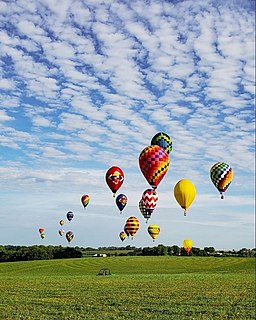
Indianola is a city in Warren County, Iowa, United States, located 14 miles (23 km) south of downtown Des Moines, Iowa. The population was 15,833 at the time of the 2020 census. It is the county seat of Warren County. Indianola is home to the National Balloon Classic, a nine-day hot air balloon festival held annually in the summer, the Des Moines Metro Opera, a world renowned major American Summer Opera Festival, and Simpson College.

Frances Elizabeth Caroline Willard was an American educator, temperance reformer, and women's suffragist. Willard became the national president of Woman's Christian Temperance Union (WCTU) in 1879 and remained president until her death in 1898. Her influence continued in the next decades, as the Eighteenth and Nineteenth Amendments to the United States Constitution were adopted. Willard developed the slogan "Do Everything" for the WCTU and encouraged members to engage in a broad array of social reforms by lobbying, petitioning, preaching, publishing, and education. During her lifetime, Willard succeeded in raising the age of consent in many states as well as passing labor reforms including the eight-hour work day. Her vision also encompassed prison reform, scientific temperance instruction, Christian socialism, and the global expansion of women's rights.

Simpson College is a private Methodist liberal arts college in Indianola, Iowa, a part of the vibrant Des Moines metropolitan area. It is accredited by the Higher Learning Commission and has about 1,250 full-time and 300 part-time students. In addition to the Indianola residential campus, Simpson has a facility in West Des Moines.

Earlham College is a private liberal arts college in Richmond, Indiana. The college was established in 1847 by the Religious Society of Friends (Quakers) and has a strong focus on Quaker values such as integrity, a commitment to peace and social justice, mutual respect, and community decision-making. It is primarily a residential undergraduate college but it offers a Master of Arts in Teaching and has an affiliated graduate seminary, the Earlham School of Religion, which offers three master's degrees: Master of Divinity, Master of Ministry, and Master of Arts in Religion.
Spray or spraying commonly refer to:
David Elton Trueblood, who was usually known as "Elton Trueblood" or "D. Elton Trueblood", was a noted 20th-century American Quaker author and theologian, former chaplain both to Harvard and Stanford universities.

The American Peace Society is a pacifist group founded upon the initiative of William Ladd, in New York City, May 8, 1828. It was formed by the merging of many state and local societies, from New York, Maine, New Hampshire, and Massachusetts, of which the oldest, the New York Peace Society, dated from 1815. Ladd was an advocate of a "Congress and High Court of Nations." The society organized peace conferences and regularly published a periodical entitled Advocate of Peace. The Society was only opposed to wars between nation states; it did not oppose the American Civil War, regarding the Union's war as a "police action" against the "criminals" of the Confederacy. Its most famous leader was Benjamin Franklin Trueblood (1847–1916), a Quaker who in his book The Federation of the World (1899) called for the establishment of an international state to bring about lasting peace in the world. In 1834 the headquarters of the society were removed to Hartford, in 1834 to Boston, Massachusetts, in 1911 to Washington, D.C. The group is now based in Washington. Its official journal is World Affairs.

Benjamin Franklin Trueblood (1847–1916) was an American pacifist who served the American Peace Society for 23 years. In this role, he functioned as the official public spokesperson and representative of the Society. He served as editor of the Society's journal, The Advocate of Peace which contained numerous articles by Trueblood. He was elected to the executive council of American Society of International Law in 1905.
Mary B. Thistlethwaite Birdsall (1828–1894) was born in Pennsylvania to English immigrants. She grew up on a farm near Richmond, Indiana, where she married Thomas Birdsall in 1848. They had three sons together. She was a journalist, a suffragist, and a temperance worker. She began her journalism career as the woman's editor at the Indiana Farmer newspaper. For about five years she owned The Lily, a newspaper for women, which she purchased from suffragist Amelia Bloomer in 1854. She helped organize the second women's rights convention in Indiana. At that Indiana convention in 1852, she was elected as secretary for the newly-formed Indiana Woman's Rights Association (renamed the Indiana Woman's Suffrage Association in 1869, and eventually became president of the organization. Birdsall was a vice-president at the fourth National Women's Rights Convention in Cleveland, Ohio, in 1853. She was among the first three women to address the Indiana legislature in 1859 to present a women's rights petition, speaking for a half-hour in support of women's suffrage. Birdsall died in Philadelphia in 1894 and interred at Earlham Cemetery in Richmond. Her Richmond home, a model of progressive architecture as espoused by Catherine Beecher, was listed on the National Register of Historic Places in 1999.
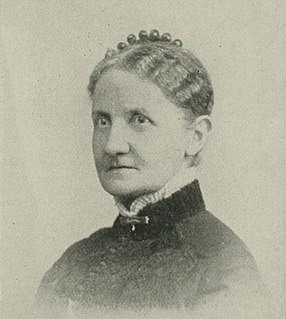
Esther Pugh was an American temperance reformer from Ohio. She served as Treasurer of the National Woman's Christian Temperance Union (WCTU), a Trustee of Earlham College, as well as editor and publisher of the monthly temperance journal, Our Union. She died in Philadelphia in 1908.
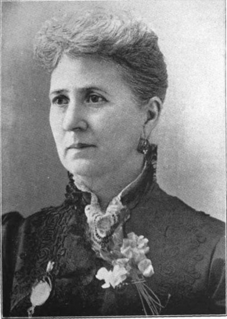
Anna Augusta Truitt was an American philanthropist, temperance reformer, and essayist. For many years, she provided services for the Woman's Christian Temperance Union (WCTU), acting as delegate from the local to the district, state and national conventions. Her essays, addresses and reports showed her to be a talented writer. Benevolence was said to be the one underlying trait of her character. Truitt died in 1920.
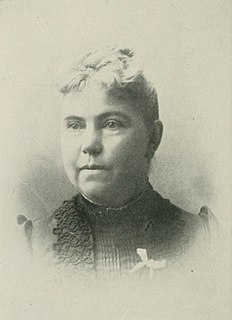
Dora V. Wheelock was an American activist and writer involved in the temperance movement. She served as president of the Nebraska state branch of the Woman's Christian Temperance Union (WCTU), the Nebraska state superintendent of press work, and a reporter for The Union Signal for Nebraska. She wrote much including for Youth's Companion. Wheelock was also elected to the board of education of Beatrice, Nebraska.
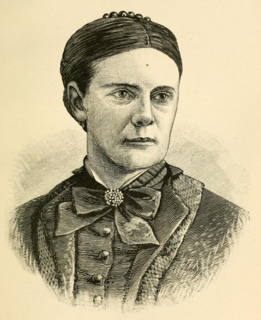
Abby Fisher Leavitt was an American social reformer and one of the prominent figures of the Ohio Women's Crusade. Leavitt also served as Secretary of the Baptist Women's Foreign Missionary Society of Ohio and Treasurer of the Women's Crusade Temperance Union. She was the leader of the "Praying Band", who, in the spring of 1874, daily marched down to the esplanade of Cincinnati, visiting saloons, and holding meetings inside or outside of liquor saloons, and on one occasion, was arrested and temporarily imprisoned for her temerity. She was a co-publisher of the newspaper of the National Woman's Christian Temperance Union (WCTU). In 1891, as the "Round the World Missionary of the WCTU", the World's WCTU elected Leavitt its life president.
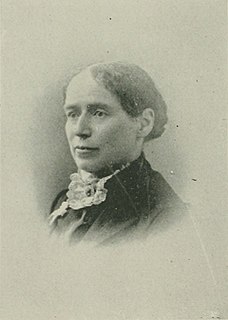
Josephine Cushman Bateham was an American social reformer, editor, and writer in the temperance movement. The Sabbath Observance Department of the National Woman's Christian Temperance Union (WCTU) was organized at the St. Louis (National) Convention in 1884, and Bateham, then of Painesville, Ohio, was appointed its first Superintendent, continuing in charge of the Department until compelled by failing health to resign in 1896. In addition, Bateham was a supporter of social reform for women.
William Hugh Feldman was a doctor of veterinary medicine known for "world-renowned achievement in two distinct fields, veterinary pathology and chemotherapy of experimental tuberculosis." He also made important contributions to the treatment of leprosy.

Alice P. Gannett was an American settlement house worker and social reformer. The Goodrich-Gannett Neighborhood Center in Cleveland, Ohio, is named in her honor.
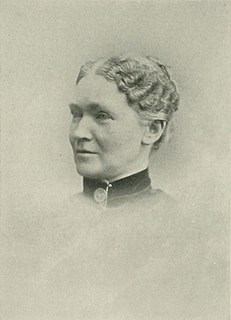
Emily Caroline Chandler Hodgin was an American temperance reformer. She was one of the leaders in the temperance crusade of Terre Haute, Indiana, in 1872, and was a delegate to the convention in Cleveland, Ohio, where the crusading movement developed into the organization of the Woman's Christian Temperance Union (WCTU). After that, she began the work of organizing forces in neighboring parts of Indiana. She became president of the WCTU in her own county and secretary of the State temperance association. She greatly aided the cause from the lecture platform, for though a member of the Society of Friends, she availed herself of the freedom accorded to the speaker in meetings.














